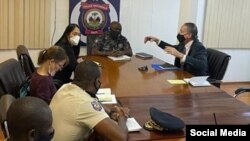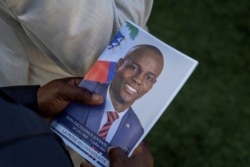President Joe Biden's special envoy for Haiti, Ambassador Daniel Foote, met virtually with Haitian civil society representatives and politicians Wednesday.
"The special envoy looks forward to hearing ideas and solutions from the group to help their country move beyond its current challenges," a State Department spokesperson told VOA.
Foote's meeting made headline news in Haiti's capital, Port-au-Prince, earlier this week.
The U.S. diplomatic effort to resolve the political void exacerbated by the assassination of President Jovenel Moise on July 7 was the subject of a bipartisan letter Senators Marco Rubio and Bob Menendez sent to Biden on Monday.
"We implore your administration, in coordination with international partners, to engage in a diplomatic effort with a broad range of democratic actors across Haitian society to build the consensus and confidence needed to hold credible presidential and parliamentary elections," the senators wrote, noting that the United States has "an important role" to play in helping Haiti overcome Moise's death.
In an interview with VOA Creole on Monday, former Haitian Senator Jerry Tardieu said that although there is an element of skepticism among the opposition, most agree that inclusive, credible and honest elections are needed to move the country forward.
"There is unity," Tardieu said, "because when I listen to Ann Avan, FND (National Front for Democracy), Tet Ansanm, when I listen to OPL (Struggling People's Organization), Fusion (of Haitian Social Democrats), Unite (Unity), Veye Yo, Verite (Truth), the Democratic and Popular Sector (of opposition parties), they are all saying the same thing. That means we know what we need to participate in elections. Our differences are small, and I believe that as long as we put Haiti ahead of our personal ambitions, we can easily and quickly agree on a political agreement."
The U.S. senators' letter also calls on Biden to assist Haiti in the investigation of the Moise slaying.
"We urge your administration to assist the Haitian authorities as they investigate this brutal attack and to cooperate with international partners to ensure justice and accountability for all individuals involved," the letter states.
VOA asked White House press secretary Jen Psaki Wednesday if President Biden has responded to the letter.
"I'm not sure we've seen that letter. I'm not familiar with it," Psaki responded.
Haitian National Police spokesperson Marie Michel Verrier told reporters police have made 44 arrests so far and seized weapons, ammunition and cash in both U.S. and Haitian currencies.
"Forty-four people have been questioned during our investigation. Among them are 18 Colombians, four Haitian Americans and 22 Haitians," Verrier said during a Monday press conference. "Among these 22 Haitians are 20 police officers."
Moise was killed at his private residence in a luxury suburb of Port-au-Prince in the early morning hours of July 7. His wife, Martine, was gravely injured and transferred to a Miami, Florida, hospital where she was treated.
The Moise case has now been turned over to the Justice Ministry, the national police said. Judge Mathieu Chanlatte will oversee the case, the dean of the Civilian Court of Port-au-Prince announced Monday. Security has been tightened for the judge, the court said.
Juan Gonzalez, the U.S. National Security Council senior director for the Western Hemisphere, told VOA in July that a team of eight FBI agents were on the ground in Haiti, assisting with the investigation into the slaying of President Moise.
"A number of officials from the Department of Homeland Security are helping on everything from tracing the weapons to the body armor and the cellphones that were being used and [doing] everything possible to get to the bottom of who was involved and who is responsible for the assassination," Gonzalez said.
Haiti Foreign Minister Claude Joseph sent a letter to United Nations Secretary-General Antonio Guterres last week, requesting an international inquiry into Moise's assassination.
"I would like to highlight the limitations, weaknesses and lack of experience of the Haitian judicial system in handling cases of such complexity, which have resulted in serious doubts about the capacity, on one hand, to justly carry out this investigation and, on the other hand, to find and bring to justice to those responsible," the letter, written in French, said.
U.N. spokesperson Stephane Dujarric told VOA the secretary-general received the letter but had not yet responded.
"We've received the letter ... which asked for assistance into the investigation of the assassination of President Jovenel and the prosecution of those who are responsible. We're taking a look at the letter, and that letter will be answered," Dujarric told VOA.
He said the U.N. mission in Haiti currently has four police advisers working with the National Police Inspector General and the Judicial Police.
As for an international tribunal, which is part of Haiti's request, Dujarric said one of the U.N.'s legislative bodies would make that decision.
"Those (requests) would have to go through competent legislative bodies of the U.N., as we've seen them in the past for other various incidents around the world, be it the Security Council, the Human Rights Council or others," he told VOA.
Jacquelin Belizaire, State Department Correspondent Cindy Saine, White House Correspondent Patsy Widakuswara, United Nations correspondent Margaret Besheer and VOA Spanish White House correspondent Jorge Agobian contributed to this report.





